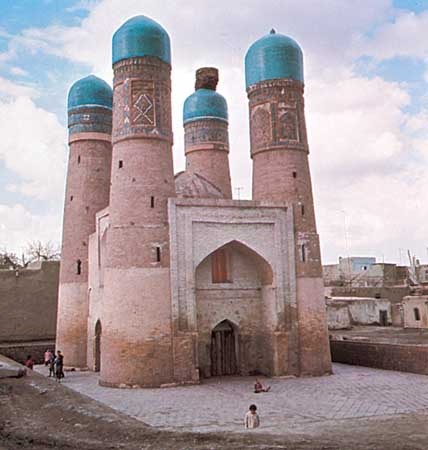Bukhara
Uzbekistan
Uzbek Bukhoro, or Buxoro, also spelled Buchara, or Bokhara
city, south-central Uzbekistan, located about 140 miles (225 km) west of Samarkand. It lies on the Shakhrud Canal in the delta of the Zeravshan River, at the centre of Bukhara oasis. Founded not later than the 1st century AD (and possibly as early as the 3rd or 4th century BC), it was already a major trade and crafts centre along the famous Silk Road when it was captured by Arab forces in 709. The capital of the Sāmānid dynasty in the 9th and 10th centuries, it later was seized by the Qarakhanids and Karakitais before falling to Genghis Khan in 1220 and to Timur (Tamerlane) in 1370. In 1506 Bukhara was conquered by the Uzbek Shaybānids, who, from the mid-16th century, made it the capital of their state, which became known as the khanate of Bukhara (Uzbek khanate).
Bukhara attained its greatest importance in the late 16th century, when the Shaybānids' possessions included most of Central Asia as well as northern Persia and Afghanistan. The emir Moḥammed Raḥīm freed himself from Persian vassalage in the mid-18th century and founded the Mangit dynasty. In 1868 the khanate was made a Russian protectorate, and in 1920 the emir was overthrown by Red Army troops. Bukhara remained the capital of the Bukharan People's Soviet Republic, which replaced the khanate, until the republic was absorbed into the Uzbek S.S.R. in 1924. It remained the capital when Uzbekistan gained independence in 1991. The city grew rapidly after the discovery in the late 1950s of natural gas nearby.
 The historic centre of Bukhara, designated a UNESCO World Heritage site in 1993, still retains much of its former aspect, with its mosques, madrassas (madrasahs; Muslim theological schools), flat-roofed houses of sun-dried bricks, and remains of covered bazaars. Among important buildings are the Ismāʿīl Sāmānī Mausoleum (9th–10th century); the Kalān minaret (1127) and mosque; the Ulūgh Beg (1417), Kukeldash (16th century), Abd al-ʿAziz Khān (1652), and Mir-e ʿArab (1536) madrassas; and the Ark, the city fortress, which is the oldest structure in Bukhara. The city's economy is based on a number of food and light industrial undertakings, including a large works processing Karakul lambs' fleece. Bukhara's importance has grown also because it is the largest city in a natural gas region. Certain traditional handicrafts, such as gold embroidery and metalworking, are still practiced. Tourism also contributes to the local economy. The city is the seat of Bukhara State University (founded 1930); there are also medical and light industry institutes there. Cultural amenities include a theatre and a museum. Pop. (2007 est.) 249,037.
The historic centre of Bukhara, designated a UNESCO World Heritage site in 1993, still retains much of its former aspect, with its mosques, madrassas (madrasahs; Muslim theological schools), flat-roofed houses of sun-dried bricks, and remains of covered bazaars. Among important buildings are the Ismāʿīl Sāmānī Mausoleum (9th–10th century); the Kalān minaret (1127) and mosque; the Ulūgh Beg (1417), Kukeldash (16th century), Abd al-ʿAziz Khān (1652), and Mir-e ʿArab (1536) madrassas; and the Ark, the city fortress, which is the oldest structure in Bukhara. The city's economy is based on a number of food and light industrial undertakings, including a large works processing Karakul lambs' fleece. Bukhara's importance has grown also because it is the largest city in a natural gas region. Certain traditional handicrafts, such as gold embroidery and metalworking, are still practiced. Tourism also contributes to the local economy. The city is the seat of Bukhara State University (founded 1930); there are also medical and light industry institutes there. Cultural amenities include a theatre and a museum. Pop. (2007 est.) 249,037.- Dmitry Kantemir
- Dmitry Medvedev
- Dmitry Mikhaylovich Golitsyn, Knyaz
- Dmitry Mikhaylovich, Knyaz Golitsyn
- Dmitry Sergeyevich Merezhkovsky
- Dmitry Sergeyevich Sipyagin
- Dmitry Shostakovich
- Dmowski, Roman
- DMT
- D.M. Thomas
- Dmytryk, Edward
- DNA
- DNA fingerprinting
- DNA sequencing
- Dnieper River
- Dniester River
- Dniprodzerzhynsk
- Dnipropetrovsk
- DNS
- Dobell, Sydney Thompson
- Doberman pinscher
- Dobrica Ćosić
- Dobrich
- Dobrolyubov, Nikolay Aleksandrovich
- Dobrovolsky, Georgy Timofeyevich